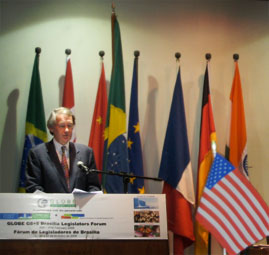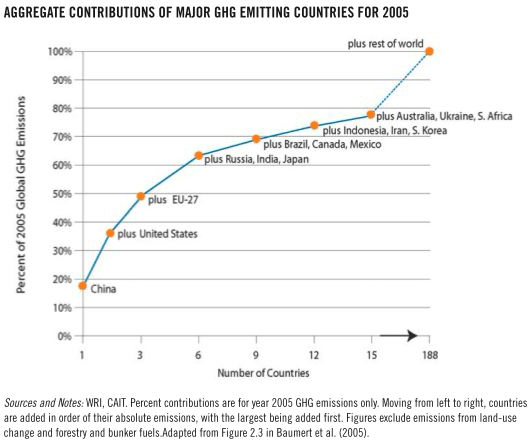
Chairman Markey at the Globe Forum in Brazil
Contact Us

Recent News
Live Copenhagen Coverage
Video available from Copenhagen includes the U.S. Delegation's press conference and network media coverage.
Click here to read more
November 17, 2009
Copenhagen Update
Copenhagen Update
As the Copenhagen climate conference came to a close, a successful deal was reached that will allow the entire world to continue to move towards forging a binding, international deal in the near future. The vast majority of the countries here at the Copenhagen climate talks recognized an accord forged by President Barack Obama, opening the door for continued reengagement on climate change. While only a handful of obstinate countries prevented full adoption of the accord by the entireconference, the broad recognition of the document ñ crafted less than 24 hours ago by 5 countries, including the United States - signifies a breakthrough in the world's climate talks.
The deal also signifies a new era in United States leadership on climate change. Along with President Obama's 11th hour negotiating tour de force, the U.S. House of Representatives sent 21 members to the talks, including Speaker Nancy Pelosi, Majority Leader Steny Hoyer, and Reps. Markey and Henry Waxman (D-Calif.), the co-authors of the House-passed climate bill. Secretary of State Hillary Clinton and Senator John Kerry (D-Mass.) also were vital voices in the talks.
More information on the framework convention is available HERE.
COP 15
It's Finally Here
It's finally here; the UN Climate Conference is underway in Copenhagen, Denmark.
Nearly 200 countries and over 100 heads of state including President Obama will meet this week to conclude two years of negotiations, working toward a new international agreement to combat climate change.
For daily reports and updates PLEASE FOLLOW our news page and twitter feed.
Climate change is a global problem that requires a global solution. While the United States must show leadership, we cannot solve this challenge alone. It will take cooperation from all countries to successfully avert irreversible warming and fight pollution on the planet we all share.
At the United Nations Climate Change Conference (COP15), leaders will have an opportunity to find solutions that will reduce global warming pollution and spark a clean energy technology revolution, creating millions of new jobs.
Top 5
Top 5 things to know about Copenhagen
- U.S. Leadership on energy and climate security
- The Waxman-Markey bill sends a strong signal to the world
- The assumption that China and India will not act is FALSE
- Spreading Clean Technology around the globe
- International agreement will protect our climate while stimulating the global economy
International agreement
The need for an international agreement
Climate change impacts every nation on Earth. All nations have an interest in cooperating to reduce global warming pollution. An international agreement will encourage all countries to adopt smart clean technology and better industrial and agricultural practices that reduce their heat-trapping emissions -actions that will create jobs and stimulate the global economy.
growing problem
Growing Problem
Global warming pollution is increasing. Without significant action this trend will continue.
Since the Industrial Revolution, countries have increasingly relied on the use of fossil fuels to power their economies, raising living standards but also the concentration of carbon dioxide and other heat trapping gases in the atmosphere. We now know that the historical emissions from developed countries are altering our present climate. Going forward, developing countries will make the largest absolute contributions to global warming pollution, despite their continued lower emissions per capita.
To stabilize atmospheric concentrations of heat-trapping gases at a level that avoids dangerous climate change, all major emitters must take steps to reduce emissions. Although their actions and commitments can differ - based on economic strength, per capita emissions or historic responsibility - all industrialized and rapidly developing countries must engage in a global effort to successfully prevent catastrophic global warming.
us leadership
The importance of U.S. leadership
While all countries must work together, the United States must take a leading role in the multinational response to global warming. U.S. leadership is crucial for many reasons but especially because:
The United States emits more global warming pollution per person than any other country in the world. Other countries have and will continue to look to the U.S. example when deciding how to act on climate change, given the past and present impact of U.S. emissions on the global climate.

The United States is a world leader in the development of new technologies. U.S. innovation can help countries around the world reduce their heat-trapping gas emissions with these technologies. For American innovators, a strong agreement in Copenhagen presents the opportunity to export clean energy technologies and to provide others with an example of efficient production. Enactment of climate and energy legislation like the Waxman-Markey bill would help get these technologies to market and put people back to work in clean energy jobs.
The UN Negotiations
The importance of the UN negotiations in Copenhagen
In December 2009, representatives of nearly 200 countries will meet in Copenhagen to decide on the structure of a new international agreement to combat climate change.
In 2007, countries agreed that climate negotiations should proceed under the auspices of the United Nations Framework Convention on Climate Change (UNFCCC). With its near-universal membership, the UNFCCC brings all key players to the table: industrialized countries with high per capita emissions, emerging economies with high growth rates and growing emissions, small island states threatened by rising sea levels, and low-income countries with limited capacity to adapt to climate change.
The process is cumbersome due to the participants' many different interests, cultures and languages. Despite its complicated nature, the UNFCCC process is the only one with such legitimacy and broad support.
The timeline for the negotiations was decided upon in the so-called “Bali Roadmap," established in Bali in December 2007 with the aim of reaching consensus on an international climate agreement by December 2009. While many challenges remain, the December 2009 meeting presents the best chance to establish a comprehensive program of climate protection in time to supplant the Kyoto Protocol before it ends in 2012. The negotiations in Copenhagen are of utmost importance to protect the most vulnerable countries and enhance binding commitments to curb global warming pollution.

